Getting a new dog and bringing it home brings so much joy and excitement. As days go by, we discover the many natural tendencies and habits that our new pup goes into. And often, frustration sets in as we seek ways to our pup’s natural tendencies.
Young pups are fond of licking and nipping at our hands. Puppy bites to show affection and as a form of play. As they grow old, nipping can turn to biting. Whether it’s playful, habitual, or aggressive biting, concern elevates, and we find ways to stop a dog from biting.
As a dog owner, you can take steps to help ensure your dog is safe around you and others. And one of these is to ensure you stop your dog from biting others.
As the owner, you are ultimately responsible for your dog’s behavior. A dog bite is a painful but common problem in the United States. Many people have to seek medical attention after being bitten by a dog.
In this blog post, we’ll delve into the reasons why dogs bite and ways to help them break off the habit.
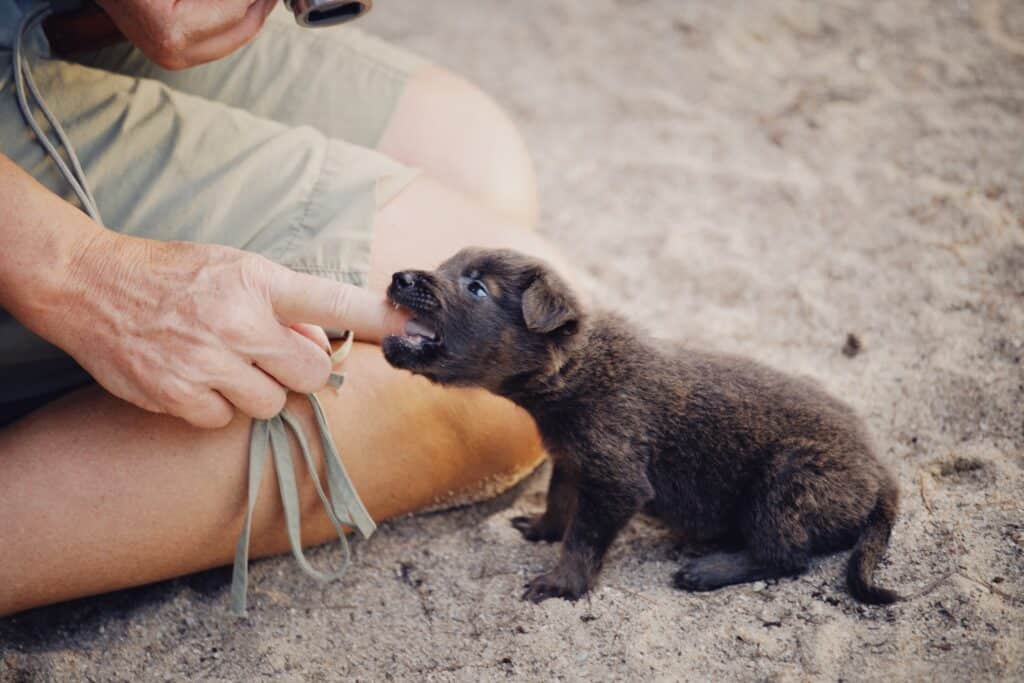
Why Do Dogs Bite?
Biting is an instinct that even our pet dogs, domesticated as they are, still have. However, some things may trigger your pup to bite. Understanding some of these trigger points is crucial because some dogs still often bite people they are around frequently.
It can happen, too, that rough play would result in a bite by accident. As human skin gets in contact with a dog’s mouth, a sudden movement may cause a tear in the skin that may be considered a dog bite.
Dogs can bite for various reasons. Understanding the causes can help us address our pet’s biting behavior appropriately.
Here are the common reasons why a dog may deliver a bite:
Proprietary
One reason your dog may bite is over their property. Dogs are naturally possessive of their belongings. Toys, food, and you are all property in the eyes of your pup. Any threat to these things can cause your dog to bite someone.
If your dog recently had puppies, they may also bite to defend their new little ones.
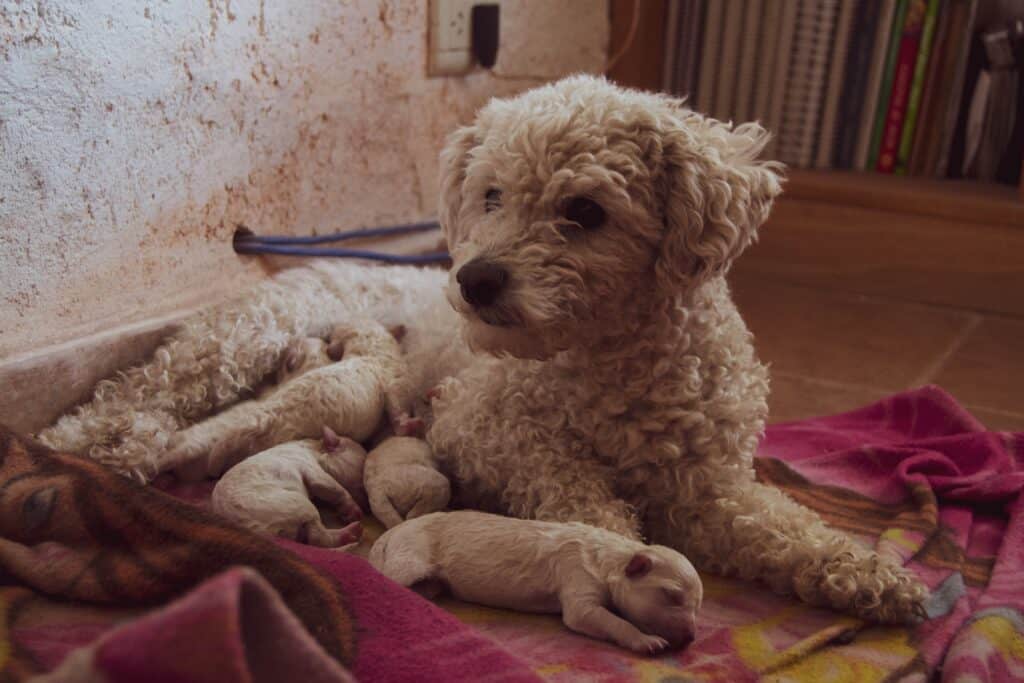
Fear or Anxiety
Another reason your dog may bite someone is out of fear. This is typical for most dogs when they see an unfamiliar dog or other animals. It is also not uncommon for dogs to attack the mailman, delivery man, or any other stranger, and even the vet when they are afraid.
For these dogs, it is a means of self-defense. They fear the threat, getting them to be aggressive.
In some cases, dogs that suffer from separation anxiety easily develop biting habits as an outlet for their anxiety. A dog’s ability to cope with being left alone results in his biting behavior.
Pain
A third reason your dog may bite someone is a response to pain. Even if your dog is friendly and mild-mannered, it may bite someone when they are in intense pain.
Dogs in pain or discomfort may lash out and bite as a defensive response. It’s their way of communicating their distress, indicating that they need help or relief from their physical condition.
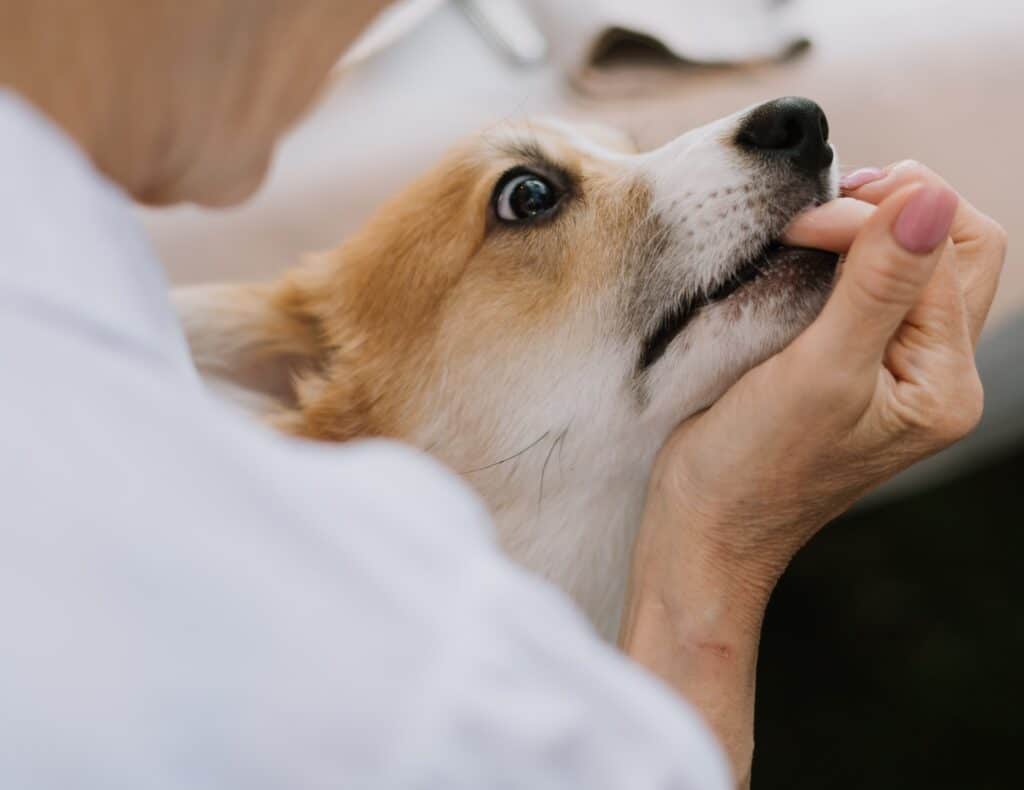
Natural Prey Instincts
A final reason your dog may bite someone is to play on their natural prey instincts. If someone zooms past on a bike or runs, your dog may think it is a chase for prey.
Some dog breeds have strong prey drives. They may exhibit biting behavior when triggered by fast movements or small animals. This instinctual behavior can be challenging to modify and may require specialized training techniques.
Dog owners can choose to steer clear of getting a dog with high prey drive by avoiding hunting dog breeds. Research on what dog breeds have low prey drives.
Dog Bite Warning Signs
If you are a new dog owner, it may take some time to learn your pup’s body language and signals. Over time, you will see that your dog will show other signs before biting that can alert you to take action.
When you are in an environment that may be stressful for your dog, look for specific warning signs that would occur before any biting. Your dog may have its ears pinned back, and its tail may be tucked or stiff.
Your dog’s hair may also stand up straight along its neck and spine. Listen for a growl or snipping noise that may also alert you that your dog is feeling threatened and may soon bite.
When you notice any of the warning signs or your dog seems to be acting unusual, try and remove your dog from the situation, if possible. By detecting these early signs that your dog may bite, you will likely be able to prevent a dangerous situation.
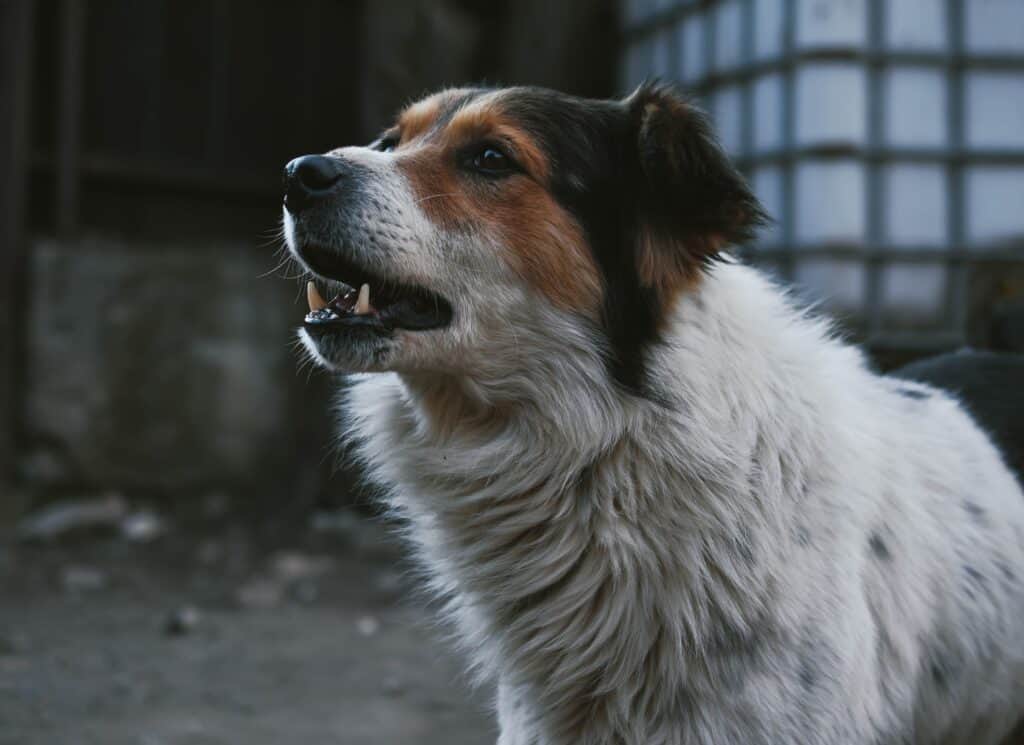
How To Stop Dog From Biting
Any dog has the potential to bite someone regardless of their breed, shape, or age. With that in mind, as a dog owner, you must take responsibility for your pup at all times.
Always be sure to watch your dog carefully when you are around potentially stressful or crowded situations. Here are some ways to help stop your dog from biting.
One way to prevent your dog from biting others is basic training. When you first bring your pup into your home, it is important to start training basic commands and lessons around the house. Teaching your dog basic commands such as stay or sit could curb his aggression and develop bite inhibition skills.
You can reinforce these skills by using positive reinforcement techniques. Training will help your dog feel safe when you are in charge, which can help prevent your dog from biting.
Socializing your dog is a big part of preventing dog bites. This is a bit easier to do if you bring home a young puppy, but even adult dogs need to be socialized.
You want to expose your pet to as many different types of people in various settings. This includes children, elderly people, and people of various mobilities and ethnicities. When you introduce your dog to new people, be sure to make the situation calm and positive.
Socialization classes also give your dog the opportunity to meet and associate with other dogs. Doing so would keep your dog feeling at ease in their presence. The next time they meet other pets, they will not feel threatened.
Like socialization, you also want to expose your young dog to new situations and noises. The younger your dog is, the more beneficial this will be in helping them be less afraid of new circumstances. Taking your dog on walks in busy areas with bicycles and loud trucks is one way to expose them to these experiences.
Unless you plan to breed your dog, getting your pet spayed or neutered will decrease some of the biting tendencies. Along with this, be sure your dog gets plenty of exercise and positive playtime with you. This helps solidify a positive human bond and burn off some excess energy.
One final way to help stop your dog from biting is limiting aggressive play with your dog. Playing games such as playful mouthing and wrestling with your dog may lead to more aggressive behaviors.
When training your dog, be sure to use positive reinforcement with praise and treats. Yelling or hitting your dog to train them will more likely result in aggressive biting.
In the worst-case scenario that you cannot grow a well-trained dog, seek professional help. A certified professional dog trainer can help teach your dog to be a good dog and stop biting.
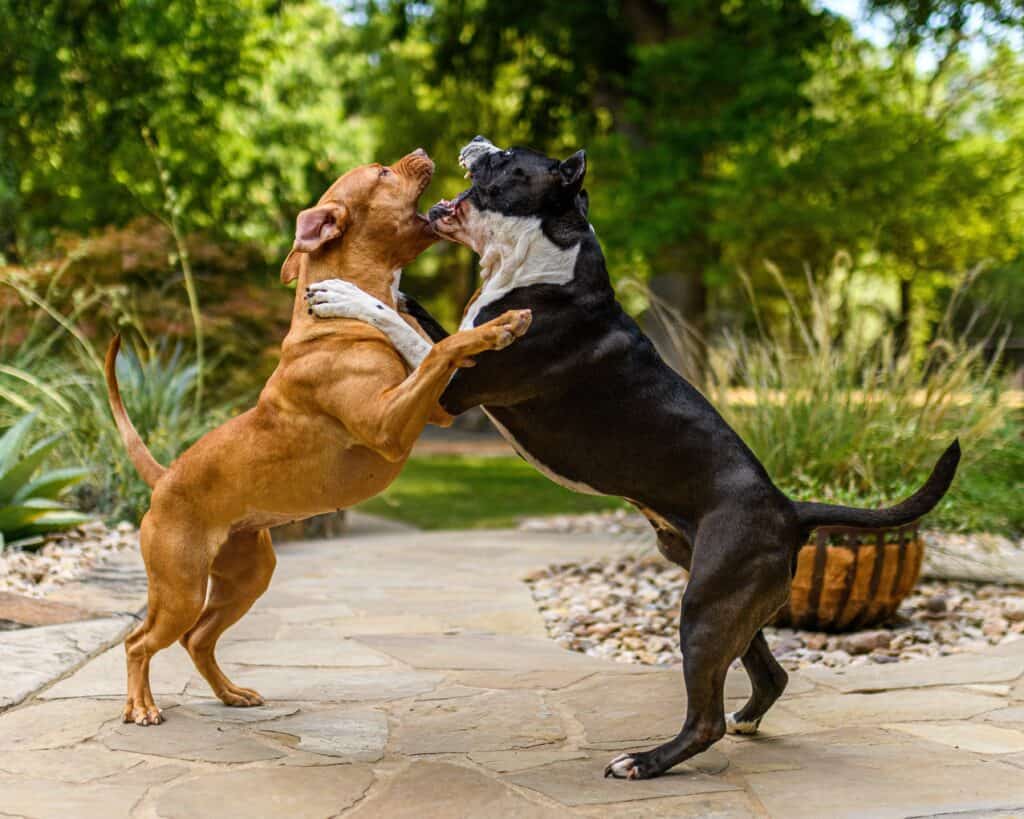
Children and Dog Biting
Children are the most common victims of bad dog bites. Exposing your pup to children of all ages may help them be less afraid of little ones. However, you also want to ensure you educate any children who may interact with your pup. Be sure that when you are in public areas near children, your dog is leashed.
If you have children in your home, it is important to teach them how to be safe around your pet and other dogs. Be sure that your child knows how to safely approach a dog. Children move quickly and suddenly, which can be frightening for a dog, causing them to bite.
Be sure to always monitor your dog when they are around young children. If you see any of the warning signs or your dog appears uncomfortable, it is wise to let them take a break, not around children. Limiting the stress your dog feels while around children is key to preventing dog bites.
What if my Dog Bites Someone?
Even if you are a responsible dog owner, your pup may bite someone. If this happens, promptly remove your dog and confine them to a safe space. Then, quickly take care of the victim. Be sure to wash the wound with soap and water. After cleaning the wound, help the victim seek medical attention.
Be sure to keep your dog up to date on all their vaccines. This will help limit the threat if your dog does bite someone. Each state has different laws on dog bites, and it is the responsibility of the owner to update himself with these laws.
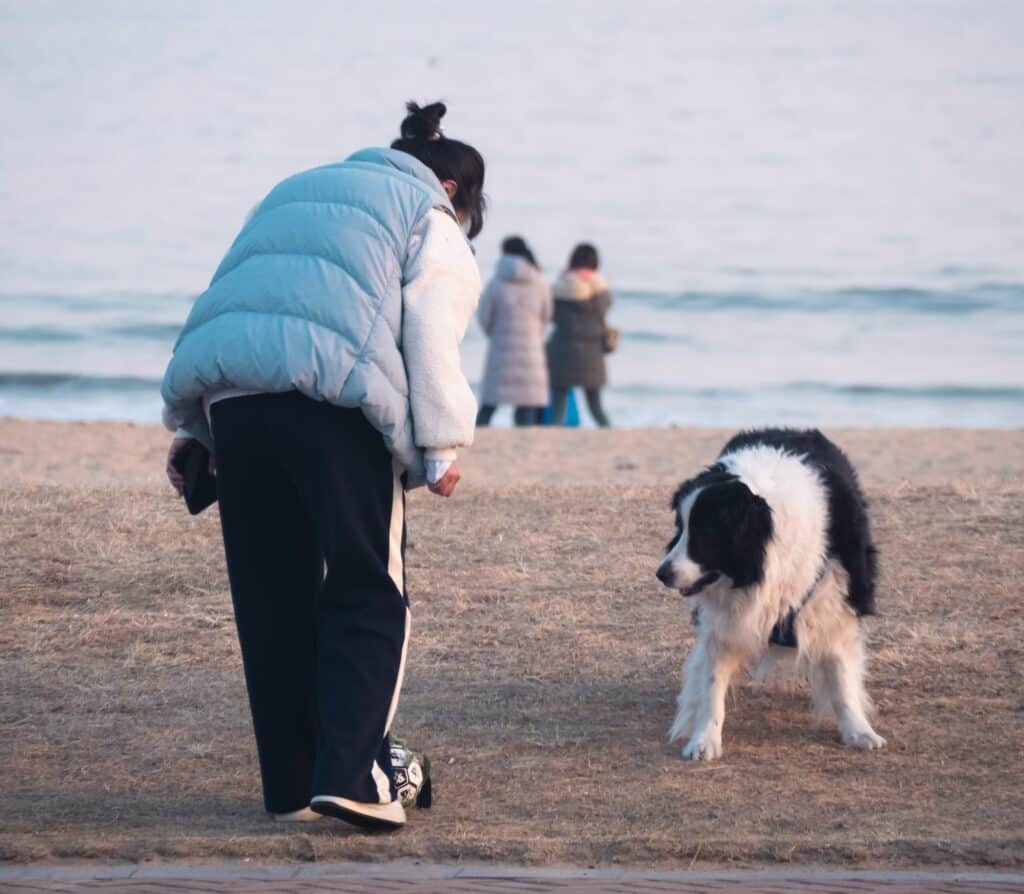
Products to Help with Dog Biting Prevention
As mentioned, giving your dog plenty of playtime and exercise is the start to preventing dog bites. Be sure to walk your dog with a safe leash and harness while you are out.
Provide your pup with fun toys that stimulate their physical and mental health. Dogs can spend their play biting on chew toys. A rope toy to play tug of war could also help train your dog to bite only those things that he is allowed to.
If your dog has a history of biting or shows warning signs when in triggering situations, you may consider using a muzzle. Muzzles are intended to only be worn for short periods while you are supervising your dog. There are several varieties of muzzles, such as the basket muzzle and the mesh muzzle.
There are several books and DVDs that serve as further resources for dog body language and biting prevention.
Canine Body Language by Brenda Aloff
Language of Dogs as a DVD
Got a young pup you want to train early to stop biting? Learn how to train your puppy to stop biting here!
